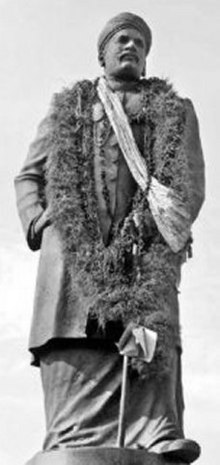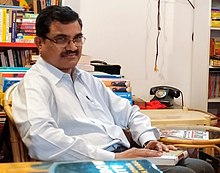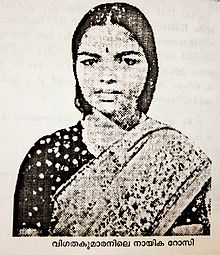![]()
Ayyankali (28 August 1863 – 18 June 1941) was an Indian politician, prominent social reformer, educator, economist, lawmaker, and a revolutionary leader. He worked for the advancement of the oppressed people in the princely state of Travancore. His struggle resulted in many changes that improved the socio-political structure of Kerala. His determined and relentless efforts changed the lives of Dalits.[2]

Ayyankali was born on 28 August 1863 in Venganoor, Thiruvananthapuram, Travancore. He was the first of eight children born to Ayyan and Mala, who were members of the Pulayar community. The family led a marginally better life compared to other Pulayars as they were given 5 acres (2.0 ha) of land by the landlord with whom Ayyan was an Adiyalan spending all his time to serve the Janmi or Zamindar (feudal landlord). Members of the Pulayar community generally worked as bonded labor to the Janmis during this time and did not have the right to own land or even enter temples to pray.
The region in which Ayyankali lived, which now forms a part of the state of Kerala, was particularly affected by social divisions during his lifetime and was described as a “mad house” of castes. The Pulayars were regarded as the slaves of the agrarian society in the kingdom and they suffered greatly from oppressive discrimination, particularly from the landowning castes including the Nair caste. Robin Jeffrey, a professor specializing in the modern history and politics of India, quotes the wife of a Christian missionary, who wrote in 1860 of the complex social code that:
… a Nair can approach but not touch a Namboodiri Brahmin: Ezhava must remain thirty-six paces off, and a Pulayan ninety-six steps distant. A Ezhava must remain twelve steps away from a Nair, and a Pulayan sixty-six steps off, and a Parayan some distance farther still. A Syrian Christian may touch a Nair (though this is not allowed in some parts of the country) but the latter may not eat with each other. Parayars, who are at the apartheid position of a savage caste discriminated society, can approach but not touch, much less may they eat with each other.
Suffering from this social injustice caused Ayyankali to join his Pulayar friends who gathered at the end of their workday to sing and dance to folk music that protested the situation.
Some joined him in forming a group that challenged the members of the oppressor castes sometimes leading to physical fights. His popularity earned him the names of Urpillai and Moothapullai translated roughly as ‘Leader of the Land’ or ‘Elder Leader’.
Ayyankali married Chellamma in 1888. The couple had seven children.
Taken from https://en.wikipedia.org/wiki/Ayyankali


